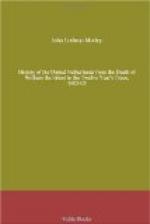As there was always danger that the movements on the east side might be at last successful, it was the command of Maurice that the labours to construct still another harbour should go on in case the Gullet should become useless, as the old haven had been since the beginning of the siege. And the working upon that newest harbour was as dangerous to the Hollanders as Bucquoy’s dike-building to the Spaniards, for the pioneers and sappers were perpetually under fire from the batteries which the count had at, last successfully established on the extremity of his work. It was a piteous sight to see those patient delvers lay down their spades and die, hour after hour, to be succeeded by their brethren only to share their fate. Yet still the harbour building progressed; for the republic was determined that the city should be open to the sea so long as the States had a stiver, or a ship, or a spade.
While this deadly industry went on, the more strictly military operations were not pretermitted day nor night. The Catholics were unwearied in watching for a chance of attack, and the Hollanders stood on the ramparts and in the trenches, straining eyes and ears through the perpetual icy mists of that black winter to catch the sight and sound of a coming foe. Especially the by-watches, as they were called, were enough to break down constitutions of iron; for, all day and night, men were stationed in the inundated regions, bound on pain of death to stand in the water and watch for a possible movement of the enemy, until the waves should rise so high as to make it necessary to swim. Then, until the tide fell again, there was brief repose.
And so the dreary winter faded away at last into chill and blustering spring. On the 13th of April a hurricane, such as had not occurred since the siege began; raged across the ocean, deluging and shattering the devoted town. The waters rose over dyke and parapet, and the wind swept from the streets and ramparts every living thing. Not a soldier or sailor could keep his feet, the chief tower of the church was blown into the square, chimneys and windows crashed on all sides, and the elements had their holiday, as if to prove how helpless a thing was man, however fierce and determined, when the powers of Nature arose in their strength. It was as if no siege existed, as if no hostile armies had been lying nearly two years long close to each other, and losing no opportunity to fly at each other’s throats. The strife of wind and ocean gave a respite to human rage.
It was but a brief respite. At nightfall there was a lull in the tempest, and the garrison crept again to the ramparts. Instantly the departing roar of the winds and waters were succeeded by fainter but still more threatening sounds, and the sentinels and the drums and trumpets to rally the garrison, when the attack came. The sleepless Spaniards were already upon them. In the Porcupine fort, a blaze of wickerwork and building materials suddenly




